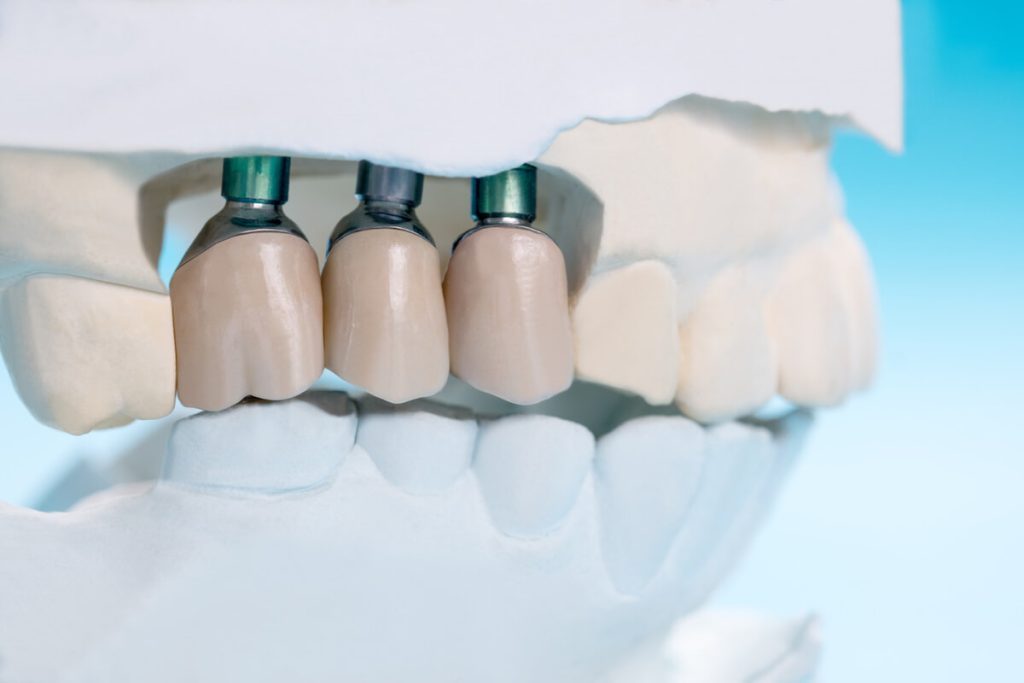Pros and Cons of Crowns and Bridges: Is It the Right Choice for You?

Crowns and bridges are standard solutions for repairing damaged teeth and replacing missing ones in dental restorations.
Recognising their pros and cons is essential for determining whether these treatments are appropriate for your dental health.
What are Crowns and Bridges?
Comprehending crowns and bridges and their purposes is critical before delving into the benefits and drawbacks.
- Crowns: A crown, also known as a cap, is a dental treatment that fully encloses a broken or decaying tooth. It restores the tooth’s shape, size, and strength and improves its appearance. Crowns can be made from various materials, including porcelain, ceramic, metal, and resin.
- Bridges: A dental restoration replaces one or more missing teeth. It typically consists of two crowns on either side of the gap (abutment teeth) with a false tooth or teeth (pontics) in between. Natural teeth or implants can support bridges.
Pros of Crowns
- Restores Function and Appearance: Crowns benefit an injured tooth’s restoration. They provide a robust, protective cover that allows you to chew and speak normally. Moreover, crowns can be made to match the colour and texture of your natural teeth, enhancing your smile.
- Durability: With proper care, crowns can last many years, often up to 15 years or more. This makes them a cost-effective solution in the long run.
- Protects Weakened Teeth: Crowns can protect teeth cracked, broken, or weakened by decay. They provide a solid cover that prevents further damage and deterioration.
- Versatility: Crowns can be used for various dental issues, including covering a dental implant, holding a dental bridge in place, or even improving the appearance of a discoloured or misshapen tooth.
Cons of Crowns
- Cost: Crowns can be expensive, mainly if they are made from high-quality materials like porcelain or ceramic.
- Preparation and Procedure: Getting a crown typically involves two dental visits. Belmont WA dentist will remove a portion of the enamel to prepare the tooth for the initial appointment. This can cause discomfort and requires the use of local anaesthesia. It can also be uncomfortable to have a temporary crown fitted while the permanent one is produced.
- Potential Sensitivity: Some people experience increased sensitivity to hot and cold temperatures after a crown is placed. This sensitivity usually diminishes over time, but it can be unpleasant initially.
- Risk of Damage: While crowns are durable, they can still chip or crack, mainly if you chew on hard things or grind your teeth. Repairing or replacing a damaged crown can be costly and inconvenient.
Pros of Bridges
- Restores Smile and Confidence: Bridges can significantly fill in the spaces left by lost teeth to improve the appearance of your smile. This can boost your confidence and make you feel more comfortable in social situations.
- Restores Functionality: Like crowns, bridges restore the ability to chew and speak properly. Missing teeth can cause difficulties in pronunciation and chewing, which bridges can alleviate.
- Prevents Teeth Shifting: When teeth are out of alignment, the adjacent teeth can shift out of place, leading to misalignment. A bridge keeps the surrounding teeth in their proper position, maintaining alignment.
- Relatively Quick Procedure: Getting a bridge typically requires fewer dental visits than implants. This makes it a quicker solution for replacing missing teeth.
Cons of Bridges
- Affects Adjacent Teeth: To install the bridge, the neighbouring teeth must be filed down to make room for the crowns that support it. This alters healthy teeth, which can be a disadvantage.
- Durability Issues: Bridges are durable but less long-lasting than implants. They typically last 5 to 15 years, after which they may need to be replaced.
- Maintenance: Bridges require special care to keep the surrounding teeth and gums healthy. Brush and floss regularly around the bridge to avoid plaque development and gum disease.
- Potential for Decay: The natural teeth supporting the bridge (abutment teeth) are still susceptible to decay and gum disease. If these teeth become damaged, the bridge can fail.
Is It the Right Choice for You?
Your dental health, money, and personal preferences influence whether crowns and bridges are the best option. Here are some considerations to help you make an informed decision:
Dental Health
- The extent of Damage: If a tooth is severely damaged or decayed but still has a healthy root, a crown can restore its functionality and appearance. However, a bridge can close the space left by one or more missing teeth, giving your smile a makeover.
- Supportive Teeth Condition: The health of the adjacent teeth is crucial for bridges. They need to be strong enough to support the bridge. Other options, like implants, might be more suitable if the adjacent teeth are unhealthy.
Budget
- Cost of Treatment: Crowns and bridges can be expensive, especially if multiple teeth are involved. It’s essential to consider your budget and whether your dental insurance covers part of the cost. Discuss payment plans and financing options with your dentist.
- Long-Term Costs: While the initial cost might be high, consider the longevity and potential replacement costs. Crowns tend to last longer than bridges, which might make them more cost-effective in the long run.
Personal Preferences
- Aesthetics: If maintaining a natural appearance is important, discuss the materials with your dentist. Porcelain and ceramic crowns and bridges offer a more natural look than metal ones.
- Comfort and Convenience: Consider the time and effort involved in the procedure and the aftercare. Crowns require two visits and some temporary inconvenience, while bridges need unique maintenance routines.
Alternative Options
- Dental Implants: Dental implants are worth considering if you’re looking for a more permanent solution and have the budget. They do not affect adjacent teeth and have a longer lifespan than bridges.
- Partial Dentures: For those looking for a removable option, partial dentures can be an alternative to bridges. They are less invasive but might not offer the same stability and comfort.
Crowns and bridges are effective solutions for restoring damaged teeth and replacing missing ones, each with advantages and disadvantages.
Crowns offer durability and protection for damaged teeth, while bridges provide a quick and aesthetic solution for missing teeth.
However, both require significant financial investment and come with potential drawbacks like sensitivity, impact on adjacent teeth, and challenges with oral hygiene.
Consider your dental condition, budget, and personal preferences, and consult with your dentist to determine the best treatment option.
Whether you choose crowns and bridges or explore alternatives like dental implants or partial dentures, maintaining proper oral hygiene and scheduling routine dental visits are crucial for long-term success and a healthy smile.
Dental Crowns and Bridges in Belmont WA
Are you prepared to enhance your oral health and regain your smile? Consult your dentist today to determine if crowns or bridges are the right solution!
At Epsom Dental Care, we provide restorative dental services to help you keep your oral health and restore your smile.
Call us at (08) 9478 2349 today or schedule your appointment online.
You can visit us at 5/132 Epsom Ave in Belmont WA..

